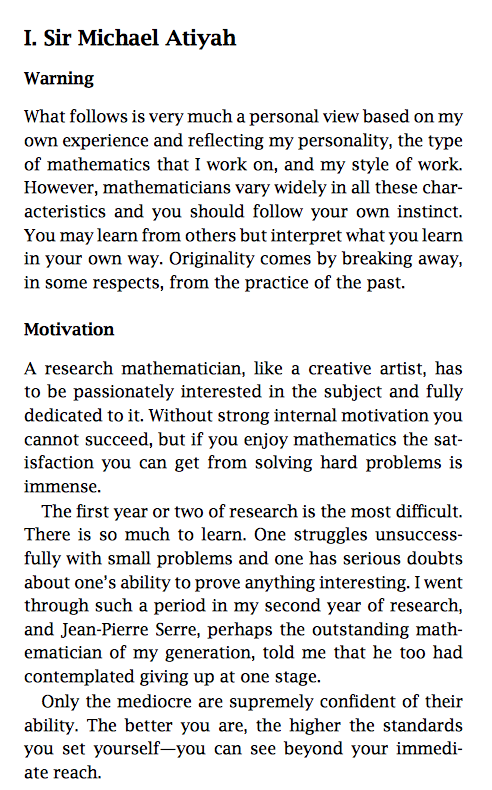Advice to a Young Mathematician
I came across this article Advice to a Young Mathematician. I think that this is a very relevant read, even for the younger members of the community. The article starts off:
The most important thing that a young mathematician needs to learn is of course mathematics. However, it can also be very valuable to learn from the experiences of other mathematicians. The five contributors to this article were asked to draw on their experiences of math- ematical life and research, and to offer advice that they might have liked to receive when they were just setting out on their careers....
For this week, let's focus on Sir Michael Atiyah's writeup, with sections of Warning, Motivation, Psychology, Problems versus Theory, The Role of Curiosity, Examples, Proof, Strategy, Independence, Style.
What is the main takeaway that you had? What speak the loudest to you?

Easy Math Editor
This discussion board is a place to discuss our Daily Challenges and the math and science related to those challenges. Explanations are more than just a solution — they should explain the steps and thinking strategies that you used to obtain the solution. Comments should further the discussion of math and science.
When posting on Brilliant:
*italics*or_italics_**bold**or__bold__paragraph 1
paragraph 2
[example link](https://brilliant.org)> This is a quote# I indented these lines # 4 spaces, and now they show # up as a code block. print "hello world"\(...\)or\[...\]to ensure proper formatting.2 \times 32^{34}a_{i-1}\frac{2}{3}\sqrt{2}\sum_{i=1}^3\sin \theta\boxed{123}Comments
My takeaway was from "The Role of Curiosity". In it, he asks the questions of "When is a particular result true? Is that the best proof, or is there a more natural or elegant one? What is the most general context in which the result holds?"
To me, those are great leading questions to consider when reading through any solution (even your own). It helps you interpret the question in a deeper context, and even relate it to other problems that you have seen before.
In a bigger picture, I like the learning method of "asking more questions". I feel that the best way to stimulate thinking and discussion is to broaden my own perspective on the problem, and try and come up with another way to approach it. This is shown in some of my comments, in which I intentionally ask questions to get a member to state a certain answer. This is ultimately very rewarding, though it can be frustrating initially.
"Only the mediocre are supremely confident of their ability. The better you are, the higher the standards you set yourself - you can see beyond your immediate reach." - Sir Michael Atiyah